Awards and recognition
Celebrating women and girls in science: PhD candidate Marie Johns reflects on her journey in STEM
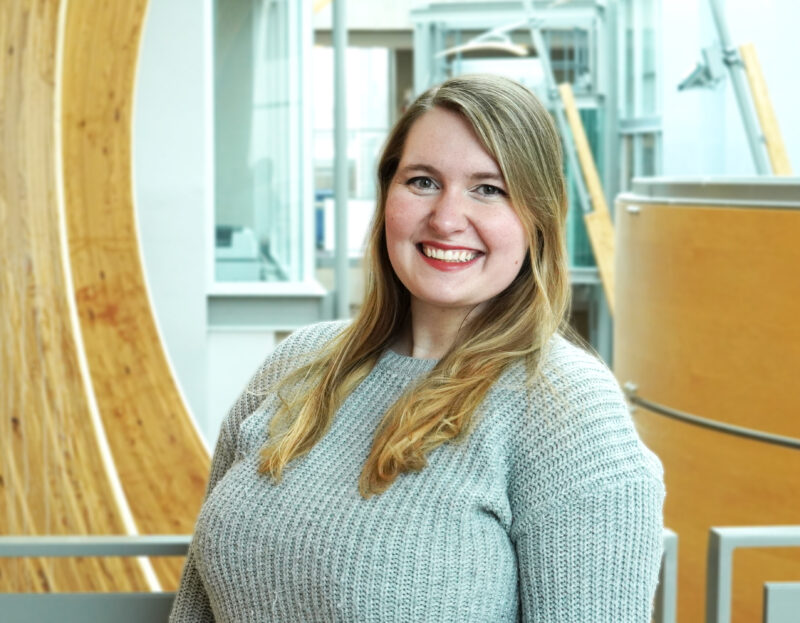
February 11, 2024 celebrates the 9th annual International Day of Women and Girls in Science. This date of recognition, proclaimed by the United Nations General Assembly, looks to close the gender gap in STEM fields by promoting “full and equal access to and participation in science for women and girls.”
In recognition of this significant day, we spoke with Marie Johns, a PhD candidate in the Jefferies Lab at the Michael Smith Laboratories and the Department of Medical Genetics. Johns (she/her) has recently been recognized for her outstanding work studying Alzheimer’s Disease, studying cells at the individual level in the hopes of highlighting targets for drug therapies.
We had the pleasure of speaking with Johns as she described her journey in science research, reflected on her successes and challenges, and shared the advice she would give to young girls as they start out on their own STEM journeys.
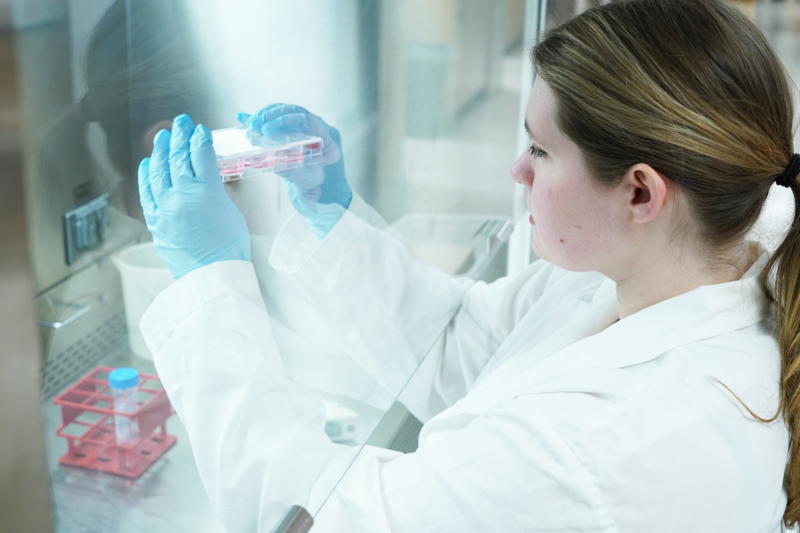
What did your journey into science graduate studies, and your research field specifically, look like?
Shortly after I started my undergraduate studies in biology and behavioural neuroscience, my grandpa was diagnosed with Lewy Body Dementia, and like many relatives of dementia patients, I felt powerless to help him. I was already fascinated with genetics and neuroscience at the time, so I challenged myself to learn everything I could to help him and my family. I remember explaining to him the concept of ‘long-term potentiation’ in the context of memory retention, and encouraging him to practice recalling memories he wanted to remember, like family members’ faces and important events. When he passed away, I decided I wanted to make a bigger difference for patients and families like my own. This desire, coupled with a fascination in neuroscience and genetics, is what drew me to the Jefferies lab for my PhD studies.
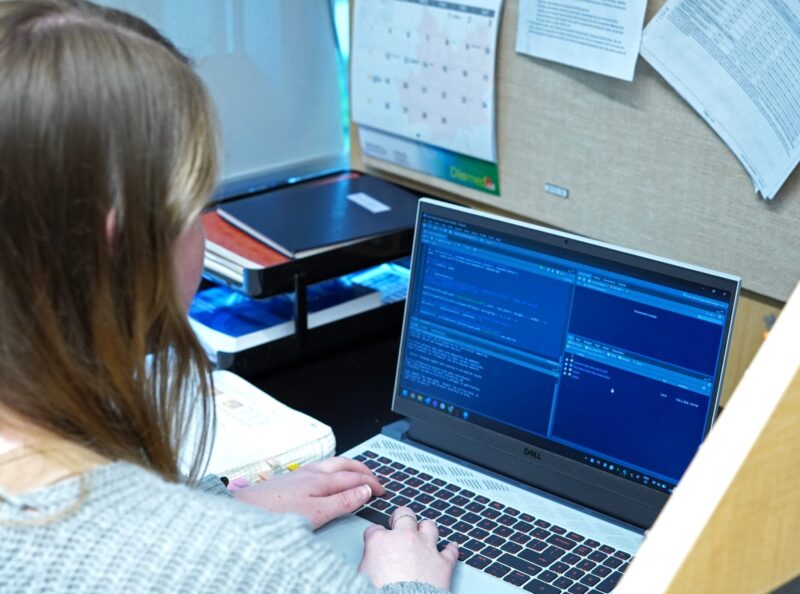 What is the current focus of your research, and what impact do you hope it will have?
What is the current focus of your research, and what impact do you hope it will have?
My thesis research centers around the neurovascular theory of Alzheimer’s Disease (AD), a progressive brain disorder with no known cure. While traditionally linked to protein plaque buildup, my lab’s pioneering work has suggested that blood vessel dysfunction in the brain can also play a significant role in AD progression. Using advanced transcriptomics, I hope to better understand AD’s molecular characteristics and the role of blood vessels specifically to address the urgent need for effective therapies. By clarifying the role of different factors in AD, I hope my work can lead to a paradigm shift in the way we perceive and treat this devastating disease, offering hope to millions of patients and families affected by AD and related dementias.
What have been your greatest successes and achievements to celebrate?
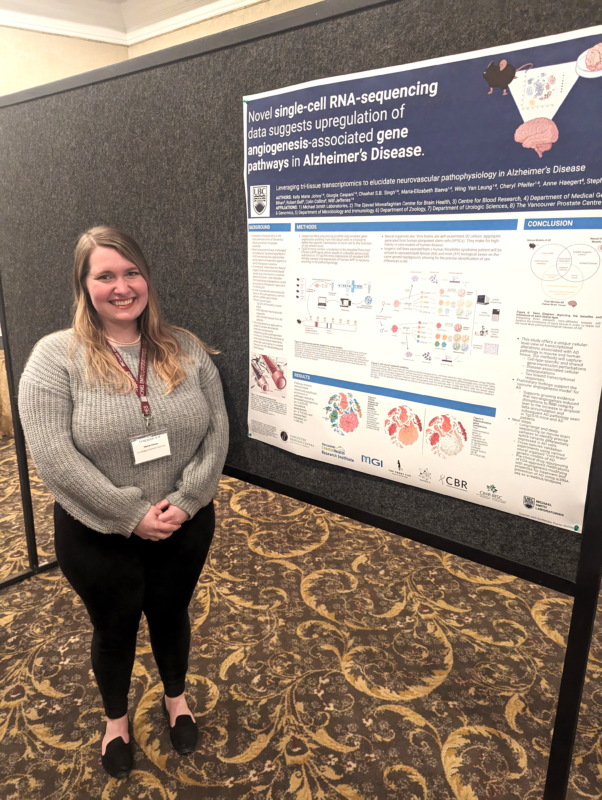
Marie Johns was awarded at a recent conference for her research poster.
I’m fortunate to have recently celebrated several key successes. In the lab, I’m particularly proud and thankful to have received the Omer H. Patrick II Memorial Prize in Alzheimer’s Disease research. As well, I recently won ‘Best of British Columbia’ at the Cascadia 5.0 BC Regenerative Medicine Conference, which affirmed for me the impact and importance of pursuing my research.
Outside the lab, my election to co-President for the Medical Genetics Graduate Student Association and the Interdisciplinary Graduate Student Network has allowed me to become a leader in my graduate student community, where I love organizing academic and social events where graduate students can connect.
Finally, it has been incredibly rewarding raising PADS Russell, a service dog-in-training, for a local non-profit. Training him to grow from a rambunctious puppy to a patient, calm, and well-mannered dog has been an incredible challenge, but also a lesson in perseverance.
These experiences, both in and outside the lab, have not only marked significant achievements in my academic career, but have also contributed to my personal growth, underscoring for me the importance of taking a well-rounded approach in academia.
What has been the biggest challenge you have faced in your scientific research journey?
As a student navigating my PhD journey with an invisible disability, I have been presented a unique set of challenges. One of the most significant I would say is the scarcity of role models in the academic sphere who have publicly shared their invisible disability. This is likely attributed to the stigmas that still exist, which often discourage individuals from openly discussing their experiences. While I have been fortunate to receive a considerable amount of understanding and support from my peers and mentors, I have also encountered judgment and discrimination along the way. Despite these experiences being difficult, they have taught me the invaluable skills of self-advocacy and resilience. Assertively communicating my needs and rights has been empowering, and I have seen changes in academia towards supporting more inclusive and supportive environments.
What advice would you give to young girls and women starting out in STEM?
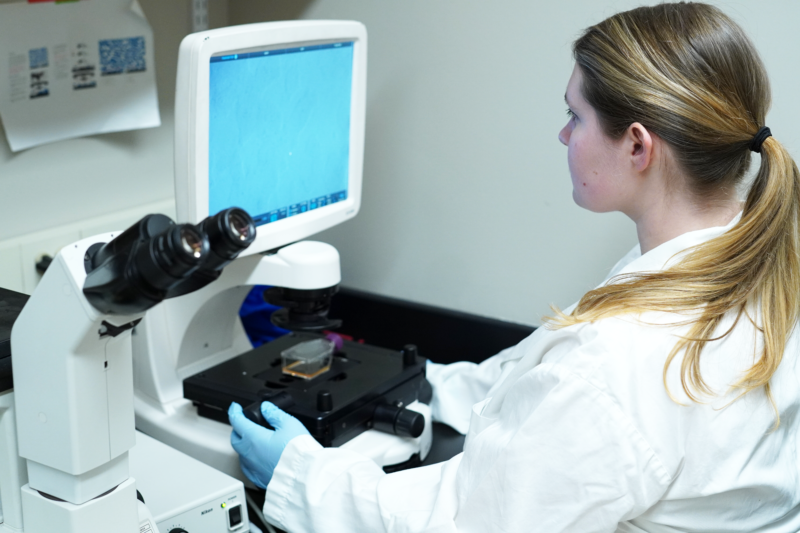 Get yourself out there! You’d be surprised the experience you can gain when you apply yourself to every opportunity you come across. Something will land, which will lead to the next opportunity, and the next. For me, my research experience started with a faculty member taking a chance on me for a directed study course in a molecular biology lab. Once I gained that initial lab experience, I got my first summer research assistant position, which led to an internship at STEMCELL Technologies, followed by a summer research program in Germany!
Get yourself out there! You’d be surprised the experience you can gain when you apply yourself to every opportunity you come across. Something will land, which will lead to the next opportunity, and the next. For me, my research experience started with a faculty member taking a chance on me for a directed study course in a molecular biology lab. Once I gained that initial lab experience, I got my first summer research assistant position, which led to an internship at STEMCELL Technologies, followed by a summer research program in Germany!
I did, however, face rejection along the way to these experiences. If there’s anything I’ve learned from this, it’s that persevering in the face of a challenge will lead to success, and that everyone faces obstacles along the way. It’s important, then, to remember to have a short-term memory for set-backs, and a longer-term memory for your successes as you carve your own path.